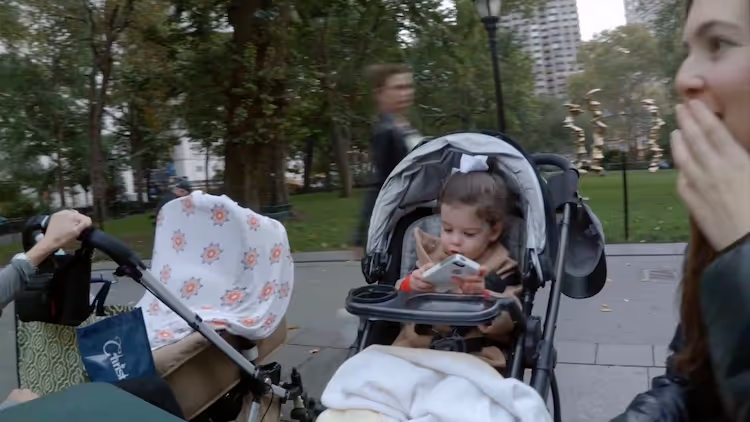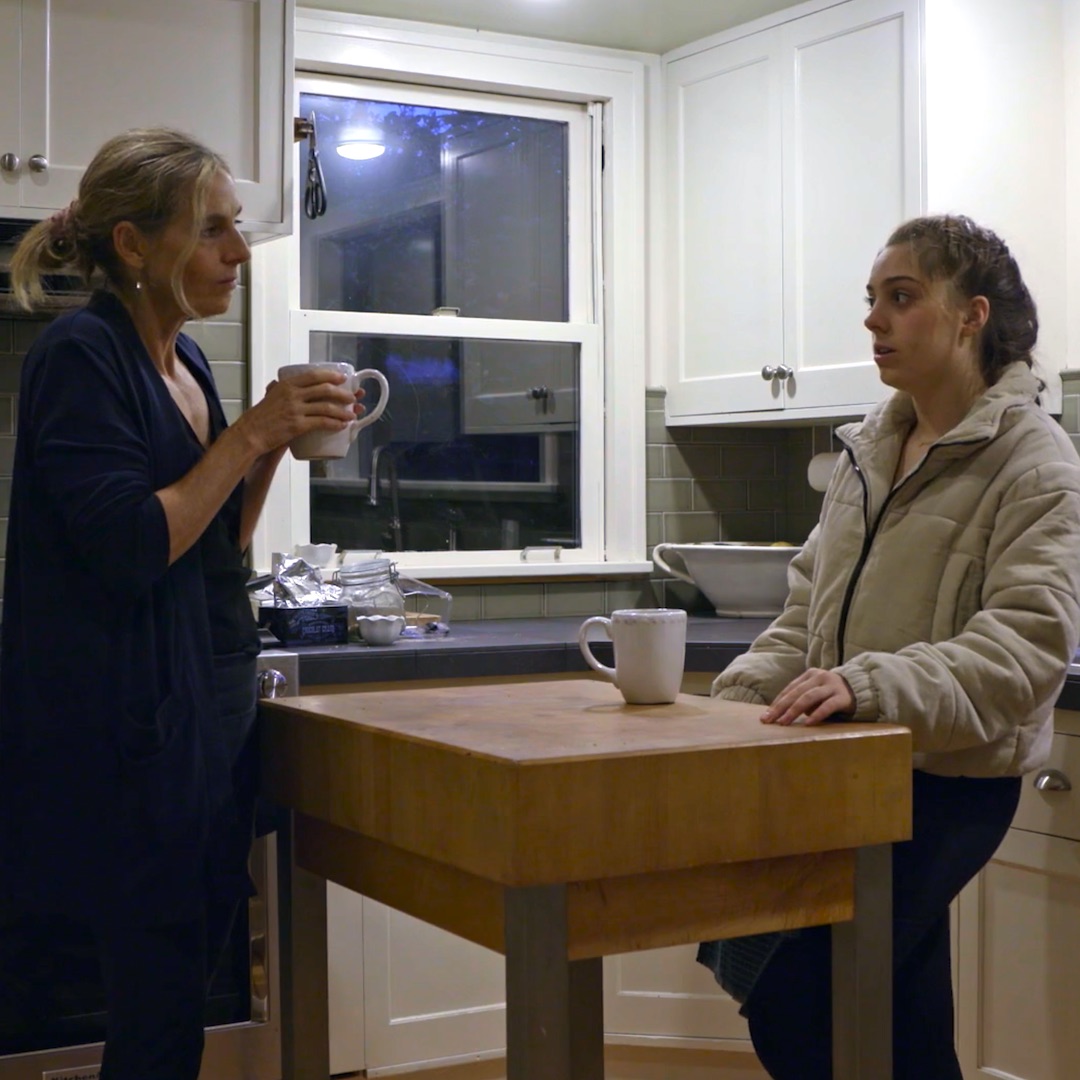


Yesterday I was talking to a mom in San Francisco who saw Screenagers this fall and she told me that she was disappointed that I gave Tessa a phone in the end. She had seen my struggle with the issue through the movie but was really hoping I wouldn't cave. This mom has a 14-year old and has been very resolute about not giving her daughter a phone. Her daughter takes the public bus around the city and walks all over town by herself but she doesn't have a phone. She asked me, "Why not just say 'no'?"
I've had this question from other parents and thought about this issue while I was making the film. This mom has seen the benefits of holding out on giving her daughter a phone. She told me she looks out the window on bus rides and she engages directly with her friends when she wants to connect. Her daughter recently was at a cafe and noticed everyone was looking down and then she told her mom that she was so happy that she had not given her a phone yet. However, the mom does wonder about the effects this rule has on her daughter’s social life. She knows she is missing out on group chats with the volleyball team and that she is left out of some social functions. The mom has had a lot of backlash from her daughter's friends parents who feel judged by her because they gave their children a phone.
My feeling is that it is great to hold off as long as possible, but the key is when, or if, you do decide to hand them their own device that you have successfully practiced setting limits. The other thing is that you have to weigh in on what the impact is of this battle -- how is it affecting your relationship with your child? During the tween and teen years it is developmentally appropriate for our kids to connect to a new tribe and many are deepening these relationships online.
I was fascinated by a new study that looked at kids from 0 to age 4 that found 75% of them own their own device such as an iPad, but 7% already own a cellphone.
Learn more about showing our movies in your school or community!
Join Screenagers filmmaker Delaney Ruston MD for our latest Podcast

Learn more about our Screen-Free Sleep campaign at the website!
Our movie made for parents and educators of younger kids
Learn more about showing our movies in your school or community!
Learn more about showing our movies in your school or community!
Join Screenagers filmmaker Delaney Ruston MD for our latest Podcast

Learn more about our Screen-Free Sleep campaign at the website!
Our movie made for parents and educators of younger kids
Join Screenagers filmmaker Delaney Ruston MD for our latest Podcast
As we’re about to celebrate 10 years of Screenagers, we want to hear what’s been most helpful and what you’d like to see next.
Please click here to share your thoughts with us in our community survey. It only takes 5–10 minutes, and everyone who completes it will be entered to win one of five $50 Amazon vouchers.
Yesterday I was talking to a mom in San Francisco who saw Screenagers this fall and she told me that she was disappointed that I gave Tessa a phone in the end. She had seen my struggle with the issue through the movie but was really hoping I wouldn't cave. This mom has a 14-year old and has been very resolute about not giving her daughter a phone. Her daughter takes the public bus around the city and walks all over town by herself but she doesn't have a phone. She asked me, "Why not just say 'no'?"
I've had this question from other parents and thought about this issue while I was making the film. This mom has seen the benefits of holding out on giving her daughter a phone. She told me she looks out the window on bus rides and she engages directly with her friends when she wants to connect. Her daughter recently was at a cafe and noticed everyone was looking down and then she told her mom that she was so happy that she had not given her a phone yet. However, the mom does wonder about the effects this rule has on her daughter’s social life. She knows she is missing out on group chats with the volleyball team and that she is left out of some social functions. The mom has had a lot of backlash from her daughter's friends parents who feel judged by her because they gave their children a phone.
My feeling is that it is great to hold off as long as possible, but the key is when, or if, you do decide to hand them their own device that you have successfully practiced setting limits. The other thing is that you have to weigh in on what the impact is of this battle -- how is it affecting your relationship with your child? During the tween and teen years it is developmentally appropriate for our kids to connect to a new tribe and many are deepening these relationships online.
I was fascinated by a new study that looked at kids from 0 to age 4 that found 75% of them own their own device such as an iPad, but 7% already own a cellphone.
Sign up here to receive the weekly Tech Talk Tuesdays newsletter from Screenagers filmmaker Delaney Ruston MD.
We respect your privacy.
Yesterday I was talking to a mom in San Francisco who saw Screenagers this fall and she told me that she was disappointed that I gave Tessa a phone in the end. She had seen my struggle with the issue through the movie but was really hoping I wouldn't cave. This mom has a 14-year old and has been very resolute about not giving her daughter a phone. Her daughter takes the public bus around the city and walks all over town by herself but she doesn't have a phone. She asked me, "Why not just say 'no'?"
I've had this question from other parents and thought about this issue while I was making the film. This mom has seen the benefits of holding out on giving her daughter a phone. She told me she looks out the window on bus rides and she engages directly with her friends when she wants to connect. Her daughter recently was at a cafe and noticed everyone was looking down and then she told her mom that she was so happy that she had not given her a phone yet. However, the mom does wonder about the effects this rule has on her daughter’s social life. She knows she is missing out on group chats with the volleyball team and that she is left out of some social functions. The mom has had a lot of backlash from her daughter's friends parents who feel judged by her because they gave their children a phone.
My feeling is that it is great to hold off as long as possible, but the key is when, or if, you do decide to hand them their own device that you have successfully practiced setting limits. The other thing is that you have to weigh in on what the impact is of this battle -- how is it affecting your relationship with your child? During the tween and teen years it is developmentally appropriate for our kids to connect to a new tribe and many are deepening these relationships online.
I was fascinated by a new study that looked at kids from 0 to age 4 that found 75% of them own their own device such as an iPad, but 7% already own a cellphone.

When teens say they hate you, it often feels personal, but it may not truly be about you. Teens sometimes direct their overwhelming feelings toward the safest person in their life. Instead of responding with logic or backing down out of fear, check that your limits are fair, practice self-compassion, and focus on validation rather than correction. If conflict feels stuck, family counseling can help both sides feel heard and understood.
READ MORE >
Thoughtful family tech rules help protect kids’ wellbeing, learning, and sleep while strengthening connection at home. Using the fresh start of a new year, this post shares eight practical tech habits families can discuss and adapt together, including shared social media check-ins, screen time inventories, device-free meals, regular gaming breaks, and keeping phones out of bedrooms at night.
READ MORE >
Psychologist Jean Twenge explains how parental controls can support healthier tech use by protecting sleep, limiting late night device access, and reducing kids’ exposure to content they are not developmentally ready to handle. She discusses why third party parental control tools are often more effective and easier to use than built in options, while acknowledging that no system is perfect. Clear boundaries, combined with technology based limits, can reduce ongoing conflict and make screen time rules easier to enforce.
READ MORE >for more like this, DR. DELANEY RUSTON'S NEW BOOK, PARENTING IN THE SCREEN AGE, IS THE DEFINITIVE GUIDE FOR TODAY’S PARENTS. WITH INSIGHTS ON SCREEN TIME FROM RESEARCHERS, INPUT FROM KIDS & TEENS, THIS BOOK IS PACKED WITH SOLUTIONS FOR HOW TO START AND SUSTAIN PRODUCTIVE FAMILY TALKS ABOUT TECHNOLOGY AND IT’S IMPACT ON OUR MENTAL WELLBEING.
